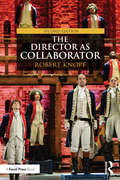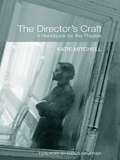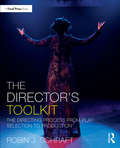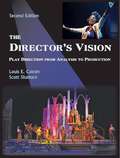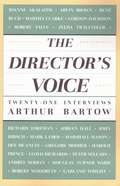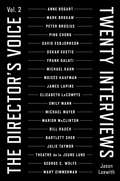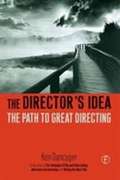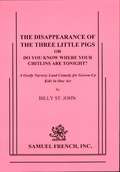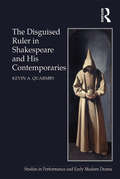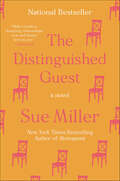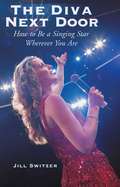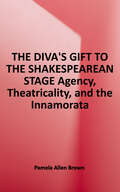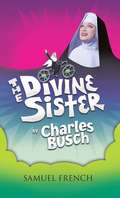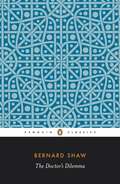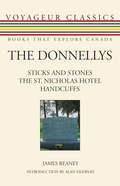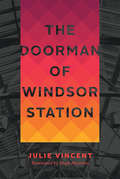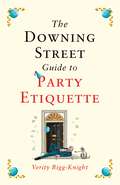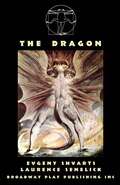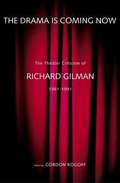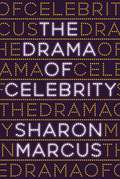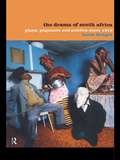- Table View
- List View
The Director as Collaborator
by Robert KnopfThe Director as Collaborator teaches essential directing skills while emphasizing how directors and theater productions benefit from collaboration. Good collaboration occurs when the director shares responsibility for the artistic creation with the entire production team, including actors, designers, stage managers, and technical staff. Leadership does not preclude collaboration; in theater, these concepts can and should be complementary. Students will develop their abilities by directing short scenes and plays and by participating in group exercises. New to the second edition: updated interviews, exercises, forms, and appendices new chapter on technology including digital research, previsualization and drafting programs, and web-sharing sites new chapter on devised and ensemble-based works new chapter on immersive theater, including material and exercises on environmental staging and audience–performer interaction
The Director's Craft: A Handbook for the Theatre
by Katie MitchellThe Director's Craft is a unique and completely indispensable step-by-step guide to directing for the stage. Written by one of the most adventurous and respected directors working today, this book will be an essential item in every student and practitioner's kitbag. It provides detailed assistance with each aspect of the varied challenges facing all theatre directors, and does so with startling clarity. It will inspire everyone, from the beginner just starting out to the experienced practitioner looking to reinvigorate their practice. Katie Mitchell shares and explains the key practical tools she uses to approach her work with both actors, production teams, and the text itself. She addresses topics such as: the ideas that underpin a play's text preparing improvizations Twelve Golden Rules for working with actors managing the transition from rehearsal room to theatre analyzing your work after a run has ended. Each chapter concludes with a summary of its critical points, making this an ideal reference work for both directors and actors at any stage of their development.
The Director's Toolkit (The Focal Press Toolkit Series)
by Robin SchraftThe Director’s Toolkit is a comprehensive guide to the role of the theatrical director. Following the chronology of the directing process, the book discusses each stage in precise detail, considering the selection and analysis of the script, the audition process, casting, character development, rehearsals, how to self-evaluate a production and everything in between. Drawing on the author’s own experience in multiple production roles, the book highlights the relationship between the director, stage manager and designer, exploring how the director should be involved in all elements of the production process. Featuring a unique exploration of directing in special circumstances, the book includes chapters on directing nonrealistic plays, musicals, alternative theatre configurations, and directing in an educational environment. The book includes detailed illustrations, step-by-step checklists, and opportunities for further exploration, offering a well-rounded foundation for aspiring directors.
The Director's Vision: Play Direction From Analysis To Production
by Louis E. Catron Scott ShattuckThe pursuit of excellence in theatre is well served by the latest edition of this eminently readable text by two directors with wide-ranging experience. In an engaging, conversational manner, the authors deftly combine a focus on artistic vision with a practical, organized methodology that allows beginning and established directors to bring a creative script interpretation to life for an audience
The Director's Voice
by Arthur BartowForemost stage directors describe their working process: JoAnne Akalaitis, Arvin Brown, René Buch, Martha Clarke, Gordon Davidson, Robert Falls, Zelda Fichandler, Richard Foreman, Adrian Hall, John Hirsch, Mark Lamos, Marshall W. Mason, Des McAnuff, Gregory Mosher, Harold S. Prince, Lloyd Richards, Peter Sellars, Andrei Serban, Douglas Turner Ward, Robert Woodruff, and Garland Wright.
The Director's Voice, Vol. 2
by Jason Loewith"Directors today are equipped with a larger toolbox than their forerunners, standing on their shoulders as well as those of pioneers in non-Western theater, experimental visual art, community-based theater, and the ever-evolving commercial theater scene."-- Jason LoewithThis second volume presents a cross-section of the most diverse and dynamic stage directors defining today's American theater, in conversation with director/producer Jason Loewith. A follow-up to the immensely popular first volume, which has sold over eighteen thousand copies, much has changed in the twenty years since The Director's Voice debuted. "The nonprofit model has been turned on its head," Loewith notes. "Institution-building is out for these directors; creating a distinctive voice from a multiplicity of influences is in." Together, these directors sketch a compelling portrait of the art form in the new century.Interviews include: Anne Bogart, Mark Brokaw, Peter Brosius, Ping Chong, David Esbjornson, Oskar Eustis, Frank Galati, Michael Kahn, Moisés Kaufman, James Lapine, Elizabeth LeCompte, Emily Mann, Michael Mayer, Marion McClinton, Bill Rauch, Bartlett Sher, Julie Taymor, Theatre de la Jeune Lune (Barbra Berlovitz, Steven Epps, Vincent Gracieux, Robert Rosen, and Dominique Serrand), George C. Wolfe, and Mary Zimmerman.Jason Loewith is a producer, director, and writer. He has served since 2002 as artistic director of Chicago's Next Theatre Company, where he conceived, co-wrote, and produced Adding Machine: A Musical, which had an award-winning run off-Broadway.
The Director’s Idea: The Path to Great Directing
by Ken Dancyger<i>The Director’s Idea</i> is a book that comes out of Ken Dancyger's teaching experience with production students at New York University and with professional producers and editors at the Maurits Binger Institute in Amsterdam. Provides an articulation of the storytelling tools of the director. This is a book about directing for directors and talented individuals who want to become directors.
The Disappearance of the Little Pigs
by Billy St. JohnComedy / 8m, 8f / Nursery Land characters, both human and animal, coexist in this goofy 1940s spoof of classic film noir detective stories for grown-up kids. When her triplets disappear, Mrs. Pig hires detective Jack B. Nimble. Jack and his klutzy secretary Miss Muffet suspect B. B. Wolf. Characters from Humpty Dumpty and Henny Penny to Jack and Mrs. Sprat become involved in the investigation before Jack finds the missing boys and earns a dubious award: a kiss from a pig.
The Disguised Ruler in Shakespeare and his Contemporaries (Studies in Performance and Early Modern Drama)
by Kevin A. QuarmbyIn the early seventeenth century, the London stage often portrayed a ruler covertly spying on his subjects. Traditionally deemed 'Jacobean disguised ruler plays', these works include Shakespeare's Measure for Measure, Marston's The Malcontent and The Fawn, Middleton's The Phoenix, and Sharpham's The Fleer. Commonly dated to the arrival of James I, these plays are typically viewed as synchronic commentaries on the Jacobean regime. Kevin A. Quarmby demonstrates that the disguised ruler motif actually evolved in the 1580s. It emerged from medieval folklore and balladry, Tudor Chronicle history and European tragicomedy. Familiar on the Elizabethan stage, these incognito rulers initially offered light-hearted, romantic entertainment, only to suffer a sinister transformation as England awaited its ageing queen's demise. The disguised royal had become a dangerously voyeuristic political entity by the time James assumed the throne. Traditional critical perspectives also disregard contemporary theatrical competition. Market demands shaped the repertories. Rivalry among playing companies guaranteed the motif's ongoing vitality. The disguised ruler's presence in a play reassured audiences; it also facilitated a subversive exploration of contemporary social and political issues. Gradually, the disguised ruler's dramatic currency faded, but the figure remained vibrant as an object of parody until the playhouses closed in the 1640s.
The Distinguished Guest: A Novel
by Sue Miller“Miller depicts [her characters] with grace and elegance, enriching their perceptions with strands of connecting images and intertwined history.... A very moving book.”—New York Times Book Review The moving story of a mother and son that touches the deepest concerns about love, art, family, and life.Lily Maynard is proud, chilly, difficult, and has become a famous writer at age seventy-two. Now, stricken with Parkinson's disease and staying with her architect son Alan, Lily must cope with her fading powers as well as with disturbing memories of the events that estranged her from her children and ended her marriage. For Alan, her visit raises old questions about his relationship with her, about the choices he has made in his life, and about the nature of love, disappointment, and grief. Profound and moving, The Distinguished Guest reveals a family trying to understand the meaning of its life together, while confronting inevitable loss and the vision of an immeasurably altered future.
The Diva Next Door: How to Be a Singing Star Wherever You Are
by Jill SwitzerYou too can be a star! If you've ever dreamed of singing on American Idol or grabbing a Grammy Award, The Diva Next Door is for you. Switzer's book, designed for everyone from total novice on up, takes a three-step approach: how to get physically and mentally in shape for a singing career, how to create and fine-tune an act, and how to shine at auditions and to book gigs. Written in the style of a caring girlfriend, the book blends practical information with anecdotes, musical quotes, pep talks, and tips. Sample cover letters, performance agreements, references, and a "diva dictionary" add value. For the hundreds of thousands of female applicants to such shows as American Idol, Nashville Star, Today's Superstar, Oprah and Star Search, and for everyone who has ever dreamed of being a professional singer Written for the complete novice in encouraging girl-to-girl style but packed with information for all levelsAllworth Press, an imprint of Skyhorse Publishing, publishes a broad range of books on the visual and performing arts, with emphasis on the business of art. Our titles cover subjects such as graphic design, theater, branding, fine art, photography, interior design, writing, acting, film, how to start careers, business and legal forms, business practices, and more. While we don't aspire to publish a New York Times bestseller or a national bestseller, we are deeply committed to quality books that help creative professionals succeed and thrive. We often publish in areas overlooked by other publishers and welcome the author whose expertise can help our audience of readers.
The Diva's Gift to the Shakespearean Stage: Agency, Theatricality, and the Innamorata
by Pamela Allen BrownThe Diva's Gift to the Shakespearean Stage traces the transnational connections between Shakespeare's all-male stage and the first female stars in the West. The book is the first to use Italian and English plays and other sources to explore this relationship, focusing on the gifted actress who radically altered female roles and expanded the horizons of drama just as the English were building their first paying theaters. By the time Shakespeare began to write plays, women had been acting professionally in Italian troupes for two decades, traveling across the Continent and acting in all genres, including tragicomedy and tragedy. Some women became the first truly international stars, winning royal and noble patrons and literary admirers beyond Italy, with repeat tours in France and Spain. <p><p>Elizabeth and her court caught wind of the Italians' success, and soon troupes with actresses came to London to perform. Through contacts direct and indirect, English professionals grew keenly aware of the mimetic revolution wrought by the skilled diva, who expanded the innamorata and made the type more engaging, outspoken, and autonomous. Some English writers pushed back, treating the actress as a whorish threat to the all-male stage, which had long minimized female roles. Others saw a vital new model full of promise. Faced with rising demand for Italian-style plays, Lyly, Marlowe, Kyd, andShakespeare used Italian models from scripted and improvised drama to turn out stellar female parts in the mode of the actress, altering them in significant ways while continuing to use boys to play them. Writers seized on the comici's materials and methods to piece together pastoral, comic, and tragicomic plays from mobile theatergrams—plot elements, roles, stories, speeches, and star scenes, such as cross-dressing, the mad scene, and the sung lament. Shakespeare and his peers gave new prominence to female characters, marked their passions as un-English, and devised plots that figured them as self-aware agents, not counters traded between men. Playing up the skills and charisma of the boy player, they produced stunning roles charged with the diva's prodigious theatricality and alien glamour. Rightly perceived, the diva's celebrity and her acclaimed skills posed a radical challenge that pushed English playwrights to break with the past in enormously generative and provocative ways.
The Divine Sister
by Charles BuschComedyCharacters: 1 male, 5 femaleMultiple SetsThe Divine Sister is an outrageous comic homage to nearly every Hollywood film involving nuns. Evoking such films as The Song of Bernadette, The Bells of St. Mary's, The Singing Nun and Agnes of God, The Divine Sister tells the story of St. Veronica's indomitable Mother Superior who is determined to build a new school for her Pittsburgh convent. Along the way, she has to deal with a young postulant who is experiencing "visions," sexual hysteria among her nuns, a sensitive schoolboy in need of mentoring, a mysterious nun visiting from the Mother House in Berlin, and a former suitor intent on luring her away from her vows. This madcap trip through Hollywood religiosity evokes the wildly comic but affectionately observed theatrical style of the creator of Die, Mommie, Die! and Psycho Beach Party."Cue the "Hallelujah" chorus! Charles Busch has put on a nun's habit and is talking to God, from whom he has evidently received blessed counsel. The Divine Sister, his new comedy at the SoHo Playhouse, finds Mr. Busch at peak form. This gleefully twisted tale of the secret lives of nuns - in which the playwright doubles as leading lady - is Mr. Busch's freshest, funniest work in years, perhaps decades." --The New York Times
The Doctor's Dilemma
by George Bernard Shaw Dan LaurenceShaw's humorous satire of the medical profession.
The Donnellys
by Alan Filewod James ReaneyBased on the true story of an Irish family with seven sons and one daughter immigrating to Biddulph Township near London, Ontario, in 1844, The Donnellys tells the tale of mystery and truths stranger than fiction. It is the story of a secret society and a massacre that shocked the Canadian public, a story overlooked by the artistic community until Reaney’s play elevated the events to the level of legend. First published in 1975, this script takes its place among other true Canadian classics on university and college course listings and in the hearts of drama lovers everywhere. The Donnellys is a trilogy comprised of Sticks & Stones, St. Nicholas Hotel and Handcuffs, three tense and mythic tragedies that garnered critical praise at the 1973 Tarragon Theatre opening and continue to acquire accolades from professors, actors and artistic directors across the country. As with the drama of Yeats, Eliot, O’Neill, Brecht and Beckett, this rendering of a generation of Irish settlers and their brutal murder at the hands of more than thirty vigilante killers is controversial and exciting to this day. Foreword, Afterword and Chronology by James Noonan.
The Doorman of Windsor Station
by Hugh Hazelton Javier Alfonso Julie VincentFrancisco will forever be haunted by the sight of his best friend Juan lying on the floor of a train station, pierced by five bullets. He’ll remember that sight as he flees the political uprising in Uruguay that night. He’ll remember when he’s holding a dying homeless man in Windsor Station in Montreal eight months later. He’ll remember when he’s a successful architect. He’ll remember when he’s having an affair with a Québécoise pianist named Claire. He’ll remember when he’s much older, a vagrant sleeping in a café that was once part of Windsor Station, where he meets his son, an activist in the student strikes in Quebec. As he tries for a better life, Francisco’s past keeps finding him, until it blurs with the present in a series of hallucinations, challenging him to reclaim his identity and his rights.
The Downing Street Guide to Party Etiquette
by Verity Bigg-KnightWhile the UK locked down to prevent the spread of COVID-19, Boris Johnson's Number Ten played host to a series of boozy shindigs. Now, for the first time, you can learn to get wasted like they do in Whitehall. The Downing Street Party Guide will take you through every stage of a successful, pandemic-defying bash, from drafting invitations to answering awkward questions later.Contents include:· Decor tips to avoid a 'John Lewis nightmare'.· The perfect playlist to start a Cabinet conga line.· How to handle the subsequent police investigation. Read on for the night of your life. Partygate? More like party GREAT!
The Downing Street Guide to Party Etiquette
by Verity Bigg-KnightWhile the UK locked down to prevent the spread of COVID-19, Boris Johnson's Number Ten played host to a series of boozy shindigs. Now, for the first time, you can learn to get wasted like they do in Whitehall. The Downing Street Party Guide will take you through every stage of a successful, pandemic-defying bash, from drafting invitations to answering awkward questions later.Contents include:· Decor tips to avoid a 'John Lewis nightmare'.· The perfect playlist to start a Cabinet conga line.· How to handle the subsequent police investigation. Read on for the night of your life. Partygate? More like party GREAT!
The Dragon
by Evgeny ShvartsA town ruled by a dragon and compelled to pay it tribute is rescued by Sir Lancelot, at a terrible price to himself. But the mayor and his son prove to be just as bad as the dragon, and Lancelot has to save the town again, this time judging it harshly.
The Drama Is Coming Now: The Theater Criticism of Richard Gilman, 1961-1991
by Richard Gilman Gordon RogoffThis engrossing book presents the first collection in more than three decades of one of America's finest drama critics. Richard Gilman chronicles a major period in American theater history, one that witnessed the birth or spread of Off-Broadway, regional theater, nonprofit companies, and avant-garde performance, as well as growing interest in plays by women and minorities and in world drama. His writing, however, is more than a revealing look at an era. It is criticism for the ages. Insightful, provocative, and impassioned, the articles represent the full range of Gilman's interests. There are essays, profiles, and book reviews dealing with such topics as the "new naturalism" in theater, Brecht's collected plays, and the legacy of Stanislavski. There is also a generous sampling of Gilman's comments on plays by O'Neill, Miller, Chekhov, Albee, Ibsen, Anouilh, Beckett, Ionesco, Pinter, Fugard, and many others.
The Drama of Celebrity
by Sharon MarcusA bold new account of how celebrity worksWhy do so many people care so much about celebrities? Who decides who gets to be a star? What are the privileges and pleasures of fandom? Do celebrities ever deserve the outsized attention they receive?In this fascinating and deeply researched book, Sharon Marcus challenges everything you thought you knew about our obsession with fame. Icons are not merely famous for being famous; the media alone cannot make or break stars; fans are not simply passive dupes. Instead, journalists, the public, and celebrities themselves all compete, passionately and expertly, to shape the stories we tell about celebrities and fans. The result: a high-stakes drama as endless as it is unpredictable.Drawing on scrapbooks, personal diaries, and vintage fan mail, Marcus traces celebrity culture back to its nineteenth-century roots, when people the world over found themselves captivated by celebrity chefs, bad-boy poets, and actors such as the “divine” Sarah Bernhardt (1844–1923), as famous in her day as the Beatles in theirs. Known in her youth for sleeping in a coffin, hailed in maturity as a woman of genius, Bernhardt became a global superstar thanks to savvy engagement with her era’s most innovative media and technologies: the popular press, commercial photography, and speedy new forms of travel.Whether you love celebrity culture or hate it, The Drama of Celebrity will change how you think about one of the most important phenomena of modern times.
The Drama of Marriage
by John M. ClumIn studying performances of marriage in modern and contemporary British and American drama, Clum highlights the fact that - paradoxically - at a time when theatre was both popular entertainment and high culture, many of the most commercially and artistically successful plays about marriage were written by homosexual men. Beginning with Oscar Wilde and focusing on some of the most successful British and American playwrights of the past century, including Somerset Maugham, No#65533;l Coward, Terence Rattigan, and Emlyn Williams in England and Clyde Fitch, George Kelly, Tennessee Williams, William Inge, and Edward Albee in the US, The Drama of Marriagelooks at how the plays they wrote about heterosexual marriage continue to impact contemporary gay playwrights and the depiction of marriage today.
The Drama of Memory in Shakespeare’s History Plays
by Isabel KarremannThis book analyses the drama of memory in Shakespeare's history plays. Situating the plays in relation to the extra-dramatic contexts of early modern print culture, the Reformation and an emergent sense of nationhood, it examines the dramatic devices the theatre developed to engage with the memory crisis triggered by these historical developments. Against the established view that the theatre was a cultural site that served primarily to salvage memories, Isabel Karremann also considers the uses and functions of forgetting on the Shakespearean stage and in early modern culture. Drawing on recent developments in memory studies, new formalism and performance studies, the volume develops an innovative vocabulary and methodology for analysing Shakespeare's mnemonic dramaturgy in terms of the performance of memory that results in innovative readings of the English history plays. Karremann's book is of interest to researchers and upper-level students of Shakespeare studies, early modern drama and memory studies.
The Drama of South Africa: Plays, Pageants and Publics Since 1910
by Loren KrugerThe Drama of South Africa comprehensively chronicles the development of dramatic writing and performance from 1910, when the country came into official existence, to the advent of post-apartheid. Eminent theatre historian Loren Kruger discusses well-known figures, as well as lesser-known performers and directors who have enriched the theatre of South Africa. She also highlights the contribution of women and other minorities, concluding with a discussion of the post-apartheid character of South Africa at the end of the twentieth century.
